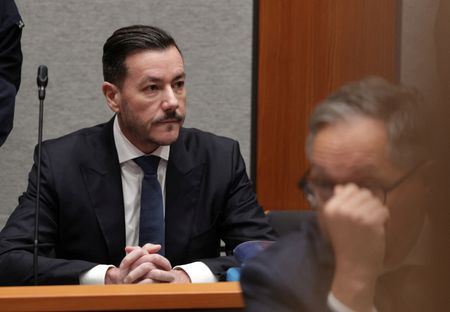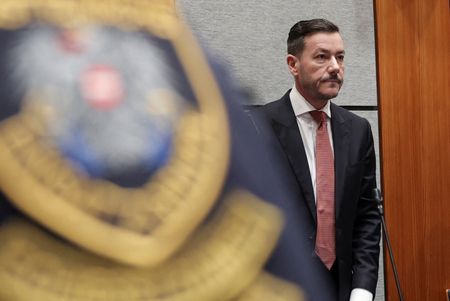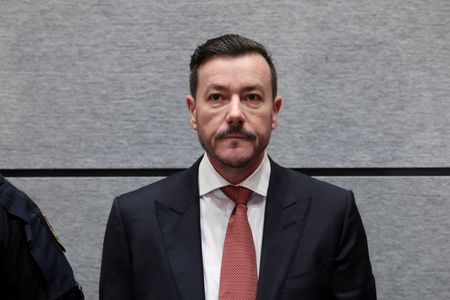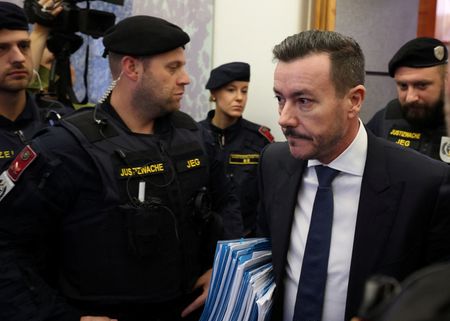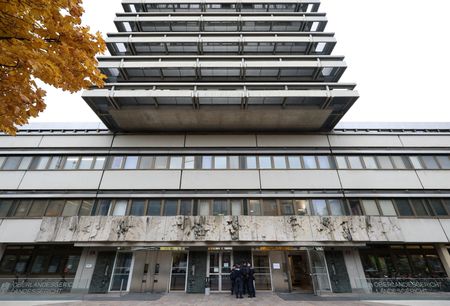By Francois Murphy and Alexandra Schwarz-Goerlich
INNSBRUCK, Austria (Reuters) -An Austrian court convicted former property billionaire Rene Benko of insolvency-related fraud on Wednesday in his first criminal trial linked to the collapse of his real estate group Signa, sentencing him to two years in prison.
The case stems from a sweeping investigation into crimes prosecutors suspect were committed in connection with Signa's collapse starting in 2023, which was the biggest postwar bankruptcy in Austria and burnt investors across Europe, including blue-chip companies in Germany and Switzerland.
Prosecutors estimate the damage caused by the various suspected crimes totals 300 million euros ($349 million).
FUNDS DIVERTED BEYOND CREDITORS' REACH
This week's trial dealt with a fraction of that sum, around 660,000 euros, transferred in late 2023 when Signa was already in financial difficulty.
Prosecutors alleged Benko sought to divert that money to keep it from creditors in the context of his insolvency as an entrepreneur. Benko, 48, pleaded not guilty to both counts and his lawyer Norbert Wess said the charges were "absurd".
Around 360,000 euros constituted various up-front rent and other payments related to a house in Innsbruck, which prosecutors argued made no economic sense.
The remaining 300,000 euros were ostensibly a gift to Benko's mother that, despite the defence's argument that the money was soon transferred back, the court ruled was enough for a conviction.
Pointing out in the court's ruling that the payment was made unconditionally, Judge Andrea Wegscheider, who presided over the trial, said: "with that, it is settled and it is enough for insolvency-related fraud".
The nine months Benko has spent in custody since his arrest in January would count towards that sentence, she added.
TOO MUCH UNCERTAINTY TO CONVICT ON SECOND COUNT
On the other count involving the house in Innsbruck, there was too much uncertainty, particularly over the property's condition at the time the lease was signed, to convict Benko, Wegscheider said.
The ruling is the latest chapter in the spectacular downfall of the tycoon, who built Signa from the ground up, expanding into Germany, Switzerland and beyond on the back of low interest rates, until the company came under strain from a surge in rates after Russia's 2022 invasion of Ukraine.
At Signa's peak, Benko enjoyed a lavish lifestyle of hunting trips and flying by private jet while his company bought stakes in prestige assets including New York's Chrysler Building and British department store chain Selfridges.
Many luxury Signa properties, such as a villa he used on Lake Garda or offices in an opulent Vienna palace, have already been seized or sold with their contents auctioned off.
Prosecutors have, so far, brought one other case against Benko that will go to trial, again alleging insolvency-related fraud, this time involving cash, luxury watches and cufflinks found in a safe. Signa's creditors, who include Germany's Deutsche Bank, insurer Allianz, Swiss bank Julius Baer and Austria's Raiffeisen Bank International, are seeking to recoup some 27.6 billion euros.
"Rene Benko is a fighter," Wess told reporters after the ruling. "It is clear that he does not agree with the verdict."
Wess did not say whether Benko would appeal. He must decide by Monday.
The case has fuelled debate in Austria about ties between business and politics, since Benko cultivated relations with current and former politicians, such as former Chancellor Alfred Gusenbauer of the Social Democrats (SPO), who was a senior executive at Signa.
Current SPO leader and Austrian Vice Chancellor Andreas Babler said on X after the verdict: "His (Benko's) case is indicative of what happens when the super-rich make the rules rather than politicians."
($1 = 0.8604 euros)
(Reporting by Francois MurphyEditing by Dave Graham, Joe Bavier and Diane Craft)


